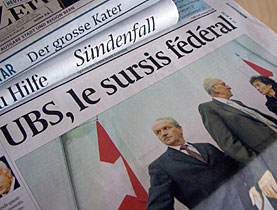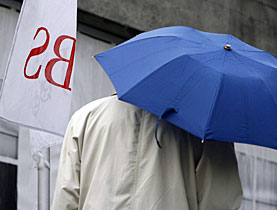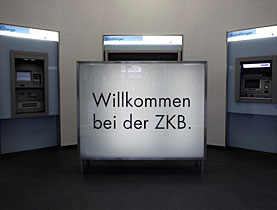“Shocking” bank bailout welcomed by press

Swiss newspapers and the international press have largely greeted the rescue package for the Swiss financial sector announced by the government on Thursday.
But commentators were quite harsh in their criticism of UBS, the main recipient of the bailout plan.
The Neue Zürcher Zeitung said the bailout was a “high price for a valuable commodity”.
“The announcement of support on Thursday for UBS and Switzerland’s financial system was like a peal of thunder.” The package, the NZZ continued, “appears intelligent, at times innovative and certainly balanced and on the whole the state has met the requirements in turbulent times, from a liberal point of view.
“In this respect, the package has a good chance of succeeding, but there are unfortunately no guarantees.”
The headline on the front page of the Zurich-based Tages-Anzeiger said the deal ushered in a “new era in the financial sector”. The main article outlines the consequences for Switzerland but summarises that “the package should be welcomed by one and all…”
A large front-page cartoon shows a UBS banker walking down a red carpet to enter an ark, with a large crowd watching on helplessly from behind a barrier. It has already begun to rain. On the deck, Noah calls down to the masses, “stay calm, you helped build the ship”.
Like most Swiss dailies, the package takes up many pages of the Tages-Anzeiger with analysis, quotes from politicians, writers and commentators as well as an interview with the UBS chairman of the board, Peter Kurer.
The Fall
“The Fall” was the title of the editorial in Der Bund. The Bern-based paper was less enthusiastic: “UBS and the authorities did not want to wait to find out what the consequences would be if they remained inactive. The UBS deal will preoccupy the government for a long time to come, and it is a very large pill to swallow.”
“The government and National Bank were faced with choosing the lesser of two evils; letting UBS fall would have been the far worse decision,” said the Berner Zeitung
“…it is not the package that is scandalous but the circumstances under which it was allowed to come so far.”
The tabloid Blick newspaper dedicated six pages to the deal but opted to put a picture of discredited former UBS chairman, Marcel Ospel, on the front page with an appeal, “Mr Ospel, pay back your bonus!”.
Courage
The Blick commentary was more serious, commending the government for taking action to prevent the worst, and displaying courage.
The Geneva-based Le Temps described the move as shocking but said it was an exception and the government’s duty to act in such a way.
“The return to normality can only occur only after there has been a major overhaul of the rules of the game,” Le Temps said.
“This reaffirms that a sustainable economy requires an impartial state; fair but strong. The financial sector is not dead but has lost its credibility. It will not regain its freedom without accepting its economic responsibilities.”
The Tribune de Genève also said the announcement came as a shock. “…and there is anger at the free ride UBS has been given. The large bank has done everything to annoy the Swiss – one in three have an account with it.
“The model chosen by Bern is the perfect illustration of the privatisation of profits and socialisation of losses,” the Tribune added. “When the situation of the UBS improves, the taxpayer will become a minority shareholder and will receive only peanuts in dividends.”
London’s Financial Times led the international press in welcoming the decision.
“Switzerland’s approach to fixing its banking system has turned out to be at once less interventionist and more far-reaching than other government-sponsored bank rescues unveiled this month…the Swiss government also seems to be much less keen than those of other countries on getting too involved in the sector,” the FT said.
“There are none of the controversial restrictions around paying dividends that have been attached to the US and UK capital injections, nor is there any suggestion of direct government influence over business strategy.
Pound of flesh
“All in all, the Swiss could probably have extracted a more painful pound of flesh from UBS as a condition of its support if it had wanted to,” the FT continued. “But at the same time, Switzerland seems to have been more radical in the long-term reforms that seem to underpin yesterday’s announcements.”
“The Swiss go a step further” was the headline of the breakingviews.com column in the International Herald Tribune. “…the major improvement on the British plan is the creation of a ‘bad bank’. This is a special-purpose vehicle into which UBS can shift up to $60 billion of mortgage-related and other toxic assets. That will leave it with one of the cleanest balance sheets in banking.”
The New York Times looked at what the deal meant for Switzerland’s self-esteem: “For the Swiss, whose usually prudent and discreet banks are as much of an international symbol of the nation as its neutrality, the Matterhorn or Swiss Army knives, the idea of the government having to shore up the financial system is a humiliating comedown.
“The knowledge that the losses at UBS stem from such un-Swiss habits as reckless borrowing and betting on shaky American mortgages is doubly painful. Many individual Swiss shareholders believe their banks should have stuck to the private wealth business they have long dominated, rather than getting caught up in what they consider the casino-like world of Wall Street.”
swissinfo, Dale Bechtel
Clients have withdrawn €54 billion (SFr82.23 billion) in assets from UBS during the past weeks.
Jean-Pierre Roth, head of the SNB, says UBS remains strong in terms of capital but is suffering from a problem of confidence.
Meanwhile an investigation by the Federal Banking Commission has reached the same conclusions as UBS as to how the downturn came about. Based on internal investigations at the bank, the commission found management lapses and “insufficient identification of pertinent risks”.
According to the office, UBS didn’t know until August 2007 the exact nature of the risks in the subprime realm. Bankers had too much confidence in risk measurement mechanisms, which, retrospectivitely, is “a serious lack on the part of the bank”.
At the start of the week the Swiss government said that it did not need to follow the example of many other countries, which had raised massive amounts of taxpayers’ money to bail out stricken banks.
Following the United States’ $700 billion (SFr790 billion) rescue package earlier this month, Britain announced a £37 billion (SFr73 billion) cash injection while Germany was poised to prop up its ailing financial system with a €470 billion (SFr724 billion) hand out.
Spain said it would provide up to €100 billion of guarantees for new debt issued by commercial banks in 2008. Norway and Portugal have also followed suit with their own bail out cash packages.
Germany, New Zealand and the United Arab Emirates are the latest countries to guarantee all bank deposits.
Iceland is close to bankrupcy.

In compliance with the JTI standards
More: SWI swissinfo.ch certified by the Journalism Trust Initiative












You can find an overview of ongoing debates with our journalists here . Please join us!
If you want to start a conversation about a topic raised in this article or want to report factual errors, email us at english@swissinfo.ch.